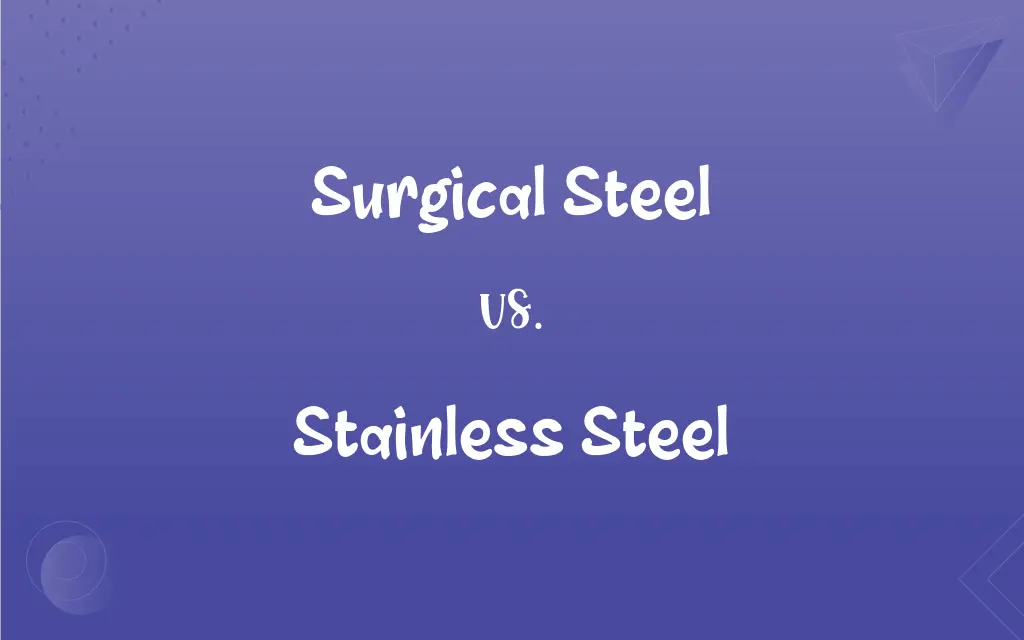Surgical Steel vs. Stainless Steel: What's the Difference?
Edited by Aimie Carlson || By Harlon Moss || Updated on October 26, 2023
Surgical steel is a grade of stainless steel used for biomedical applications; stainless steel is an alloy of iron resistant to corrosion.

Key Differences
Surgical steel and stainless steel both have a primary foundation in steel, but their applications and specifications differ significantly. Surgical steel is a specific type of stainless steel that meets stringent criteria for biomedical applications. It's known for its resistance to corrosion, durability, and minimal reaction with the human body, making it ideal for surgical instruments and body jewelry. On the other hand, stainless steel is a broad category of steel that's resistant to corrosion because of the presence of chromium. While surgical steel is a type of stainless steel, not all stainless steels can be classified as surgical.
Stainless steel, widely recognized for its silver sheen, is often used in kitchen appliances, cookware, and various architectural elements due to its corrosion-resistant properties. The term "stainless" stems from its ability to resist stains and rusting, attributed to its protective chromium oxide layer. Meanwhile, surgical steel stands apart, primarily due to its biocompatibility. In medical settings, it's crucial that metals don't react adversely with the body, and surgical steel meets this requirement.
Surgical steel's non-reactive nature makes it a popular choice for body implants, surgical instruments, and body piercings. It ensures that there's minimal risk of allergic reactions or infections when in direct contact with the body. Stainless steel, while corrosion-resistant and robust, doesn't necessarily meet the stringent criteria set for medical-grade applications. It's essential to recognize that while all surgical steel is stainless steel, the converse isn't true.
A notable distinction between surgical steel and stainless steel is the variety in the latter's grades and applications. Stainless steel has multiple grades, each with varying alloy compositions catering to specific requirements, from cutlery to building facades. Surgical steel, by contrast, has a narrower scope, emphasizing properties that align with medical safety standards.
Comparison Chart
Primary Use
Biomedical applications
Wide range of applications including kitchenware and construction
ADVERTISEMENT
Reactivity
Minimal reaction with the human body
Depends on grade; not all are biocompatible
Application Examples
Body implants, surgical instruments, piercings
Cookware, appliances, architectural elements
Range of Grades
Limited to types that are biocompatible
Numerous grades with varying properties
Association
A type of stainless steel
A broad category of steel with chromium to prevent corrosion
Surgical Steel and Stainless Steel Definitions
Surgical Steel
Surgical steel is specifically designed for medical applications.
Surgical instruments are typically made of surgical steel to ensure safety.
ADVERTISEMENT
Stainless Steel
Stainless steel contains at least 10.5% chromium for corrosion resistance.
The chromium in stainless steel cutlery prevents rusting.
Surgical Steel
Surgical steel exhibits high resistance to corrosion in bodily environments.
Due to its resilience, surgical steel is often used for internal medical devices.
Stainless Steel
This steel variety is used in diverse applications, from cutlery to construction.
Many modern buildings feature stainless steel facades for a sleek look.
Surgical Steel
It's a grade of stainless steel with enhanced properties.
Unlike standard stainless steel, surgical steel earrings reduce the risk of skin irritation.
Stainless Steel
Stainless steel is recognized for its silver sheen and durability.
Stainless steel appliances are popular for their sleek appearance and longevity.
Surgical Steel
This steel type is known for its biocompatibility.
Many opt for surgical steel jewelry to avoid allergic reactions.
Stainless Steel
It has multiple grades, each with different properties.
The stainless steel grade used in bridges differs from that in kitchen sinks.
Surgical Steel
Surgical steel meets stringent criteria for body contact.
Surgeons prefer surgical steel tools for operations.
Stainless Steel
Stainless steel is an iron alloy resistant to rust and staining.
Stainless steel pans are favored for their durability.
FAQs
Why is stainless steel called "stainless"?
It's called "stainless" because of its ability to resist stains and corrosion.
What is surgical steel primarily used for?
Surgical steel is primarily used for biomedical applications like surgical instruments and body piercings.
Is stainless steel resistant to rust?
Yes, stainless steel is resistant to rust due to its chromium content.
Do stainless steel products require special maintenance?
Regular cleaning with appropriate cleaners is enough; no special maintenance is typically needed.
Why is surgical steel used in piercings?
Its non-reactive nature and hypoallergenic properties reduce the risk of skin irritation.
What makes stainless steel different from regular steel?
The presence of at least 10.5% chromium gives stainless steel its corrosion resistance.
Can stainless steel tarnish over time?
While resistant, under certain conditions, stainless steel can tarnish or discolor.
Is surgical steel magnetic?
Some grades might be slightly magnetic, but generally, it's considered non-magnetic.
Can stainless steel be recycled?
Yes, stainless steel is 100% recyclable.
Can all stainless steel be used for medical applications?
No, only specific grades like surgical steel meet the stringent criteria for medical use.
Are there different grades of surgical steel?
Yes, there are different grades, but all meet stringent biocompatibility criteria.
Where might I commonly find stainless steel in a household?
Stainless steel is commonly found in kitchen appliances, cookware, and cutlery.
Why is surgical steel preferred for body implants?
Its biocompatibility ensures minimal risk of allergic reactions or infections.
How do I clean stainless steel appliances?
Use a soft cloth with a mild detergent or specific stainless steel cleaners for best results.
Are all surgical steels the same?
No, there are variations, but all types prioritize biocompatibility.
Can surgical steel rust?
While highly resistant, under extreme conditions, it might show signs of corrosion.
Is surgical steel hypoallergenic?
Yes, surgical steel is often hypoallergenic, making it suitable for body piercings.
What gives stainless steel its corrosion resistance?
The chromium in stainless steel forms a protective layer that prevents corrosion.
What's the primary element in stainless steel that prevents rust?
Chromium is the key element that offers rust resistance.
Is surgical steel more expensive than regular stainless steel?
Often, due to its specific properties and medical-grade criteria.
About Author
Written by
Harlon MossHarlon is a seasoned quality moderator and accomplished content writer for Difference Wiki. An alumnus of the prestigious University of California, he earned his degree in Computer Science. Leveraging his academic background, Harlon brings a meticulous and informed perspective to his work, ensuring content accuracy and excellence.
Edited by
Aimie CarlsonAimie Carlson, holding a master's degree in English literature, is a fervent English language enthusiast. She lends her writing talents to Difference Wiki, a prominent website that specializes in comparisons, offering readers insightful analyses that both captivate and inform.
































































